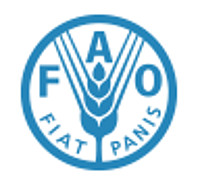 Rome. - A new UN programme funded by Germany will help eight developing countries revamp and strengthen their adaptation responses to climate change. Through the Integrating Agriculture in National Adaptation Plans programme, FAO and UNDP will work with ministries of agriculture in Nepal, Kenya, the Philippines, Thailand, Uganda, Uruguay, Viet Nam and Zambia to incorporate agricultural sectors into National Adaptation Plans (NAPs) in order to safeguard livelihoods, raise agricultural production and boost food security.
Rome. - A new UN programme funded by Germany will help eight developing countries revamp and strengthen their adaptation responses to climate change. Through the Integrating Agriculture in National Adaptation Plans programme, FAO and UNDP will work with ministries of agriculture in Nepal, Kenya, the Philippines, Thailand, Uganda, Uruguay, Viet Nam and Zambia to incorporate agricultural sectors into National Adaptation Plans (NAPs) in order to safeguard livelihoods, raise agricultural production and boost food security.
In particular, the initiative aims to help countries make improvements in medium- to long-term planning and budgeting processes.
Under the four-year initiative, countries will receive various types of support. FAO will offer policy advice and technical support to ensure that climate change adaptation priorities in the agriculture, forestry, and fisheries sectors are incorporated in this planning process. UNDP will engage with countries in managing climate risk, in planning and budgeting, and help them strengthen information systems, project formulation, and coordination between government institutions.
The initiative has immediate potential to link with and amplify existing programmes in the target countries and improve their prospects for accessing global funds for climate finance, such as the Global Environment Fund and the Green Climate Fund.
Funding for the $12 million effort is being provided by Germany's Federal Ministry for the Environment, Nature Conservation, Building and Nuclear Safety (BMUB).
"Our food security in the decades to come depends on our collective ability to innovate and adapt to climate change. The agriculture sector is critical to every nation and is a lifeline for livelihoods. Therefore, FAO and UNDP have joined forces to support partner countries to integrate agriculture into National Adaptation Planning (NAP) processes," said Adriana Dinu, Executive Coordinator UNDP Global Environment Finance Unit.
"Ministries of agriculture, fisheries and forestry need to be at the table when countries develop and implement domestic policies to address climate change," added Martin Frick, Director of FAO's Climate, Energy and Tenure Division.
The new programme builds on existing FAO and UNDP country activities, by assisting them to develop tailored responses to their needs. For instance:
- In Nepal, there is a need to increase conservation of drought-resistant crop varieties by adopting water-conserving farming practices and promoting crop diversification. The consequences of last year's earthquakes highlight the importance of reducing risks for farmers due to climate and disasters.
- In Uganda, UNDP is helping set up a much-needed early-warning system for climate risks. The program will link to FAO projects that include educating farmers in the use of drought-tolerant seeds, plants and trees, as well as expand eucalyptus plantations for charcoal.
- FAO and UNDP will also expand their efforts in the Philippines to map vulnerability to food insecurity due to climate change, and explore ways to scale up risk-transfer mechanisms for farming communities.
- In Uruguay, efforts to restore degraded pasture lands and at-risk coastal ecosystems will be central to the new programme.
FAO and UNDP plan to roll out this work in other countries as the programme expands.
Three-fourths of the world's poor live in rural areas and depend on agriculture for their livelihoods. Their climate change adaptation needs range from improving crop varieties to cope with drought, salinity and changing weather conditions to new methods of cultivation and modernized water and irrigation systems.
Many developing countries are expected to bear the brunt climate change impacts on agriculture. National Adaptation Plans (NAPs) must envision how to preemptively minimize the impact of potentially declining yields and irregular harvests.
Source: www.fao.org








